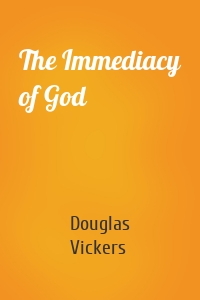Douglas Vickers
8 кн.
The Christian’s Highest Good
Competing worldviews cast their impact on the church and the Christian confession. What does it mean to be a Christian in an age that threatens cultural dissolution? Related questions press on a calm consideration of the meaning of the Christian life. Who is Jesus Christ of whose salvific work the Christian confession depends? Why did Jesus Christ come into the world? What is to be said of the human condition following the Adamic fall, which, as John Milton says, «brought death into the world...
| Автор | Douglas Vickers |
Discovering the Christian Mind
The relation between Christianity and the claims of reason has been at times sharp and conflicting and at times symbiotic. Noted scholars in the church and in the secular academy have asked what Christianity has to do with culture and what the Christian mind has to say, or should be saying, by way of critique in the marketplace of ideas. In Discovering the Christian Mind, Douglas Vickers argues insightfully that prior to the question of what the Christian mind should be doing or saying is that...
| Автор | Douglas Vickers |
When God Converts a Sinner
In an age of theological innovation and doctrinal discount, the heritage of evangelical Reformed theology is in increasing danger of betrayal. Old established understandings of «the faith once delivered to the saints» are under attack, disturbing the peace of the church, tarnishing its witness, and challenging its purity. Against the pressures of newer fashions in thought, Douglas Vickers here returns to the seventeenth-century confessions of faith and illustrates from successive chapters common...
| Автор | Douglas Vickers |
The Immediacy of God
The confessing church in our time treats lightly the doctrinal deposit of its theological inheritance. The clamor of competition for the reconstruction of belief-systems has too often neglected older and more secure moorings. In a postmodern age that countenances individual belief-idiosyncrasies and accords them sanctity, the answer to the ordinary man's question, «What is the gospel?» is often clouded and confused. Against doctrinal uncertainties and insecurities, The Immediacy of God...
| Автор | Douglas Vickers |
The Cross
A question has challenged the human conscience for two thousand years: «How are we to explain the presence of Jesus Christ in this world?» Or who, indeed, was Jesus Christ? A man like the rest of men? Or was he a divine Person? Why was it that well-practiced soldiers who failed to fulfill their commission to arrest him said: «Never man spoke like this man?» The early church confirmed the apostles' declaration that Jesus Christ was the eternal Son of God and that he came into the world to...
| Автор | Douglas Vickers |
Belief and Evangelism
The church's witness to the world falters in an age of doctrinal uncertainty, emerging experiments of life forms and behavior norms, and consequent cultural pressures. Against the disturbing influences that result, two questions demand response as the church's relation to conflicting intellectual fashions is brought under scrutiny. First, on the level of belief foundations, what is to be understood as the deposit of truth that has been entrusted to the church in the gospel it has...
| Автор | Douglas Vickers |
Being and Belief
The confession the church makes to the world sits oddly in the contemporary cultural complex. Intellectual fashions in the marketplace of ideas have moved beyond an accommodation of biblical-theological categories. Philosophy is unsure of its status in an amorphous postmodernism, and theology threatens to degenerate into intellectual experimentation. They have become mutually suspicious and hesitant of conversation. But a heavy fault lies with the church's own confessional status. For what...
| Автор | Douglas Vickers |
The Divine Purchase
The contemporary church exhibits an elasticity and diversity of doctrine that at times sits oddly with biblical foundations. The presuppositions that God is and that God has spoken too often give place to the assumed priority of the explanatory competence of human reason. In that, the theology of the church is captive to the thought forms of an Enlightenment rationalism on one hand, or the looseness of postmodernist assumptions of individual autonomy on the other. In those respects,...
| Автор | Douglas Vickers |









